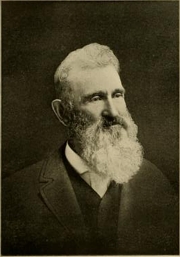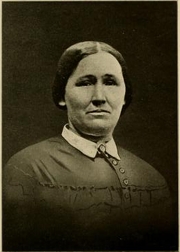|
Mr. Hunt, who is the oldest living representative of one of Des Moines county's pioneer families, was born on the farm on which he still resides, in Union township, Dec. 23, 1839, a son of Samuel and Martha (McGee) Hunt. The father was a native of Bond county, Illinois, where his birth occurred on Jan. 21, 1809, and where he resided until attaining his majority. At that time he removed to Macomb, McDonough county, Ill., and for several years followed various occupations in that city. But in 1835 he joined the great westward movement, and coming to Des Moines county, entered from the government one hundred and sixty acres of land in Union township. He then returned to Macomb, where he wedded Miss McGee. In 1838 he brought her to Iowa, and they settled on his homestead. The land was in its wild state, and he was compelled, in common with the other courageous pioneers of his day, to surmount great difficulties in preparing it for cultivation. These difficulties he attacked with the high resolution which always characterized him, and in a few years he cleared away much of the forest, brought the prairies under the dominion of the plow, and from the wilderness began to reap the hard-earned fruits of toil. In addition to farming he became to some extent interested in raising and feeding stock, in which he achieved a fair proportion of success; and he also engaged largely in buying and selling farm property, at one time being the owner of approximately eight hundred acres in Des Moines county. He continued to reside on the land where he first settled until the time of his death, in November, 1889. The demise of his wife occurred Dec. 9, 1885. Both were members of the Methodist Episcopal church, and were earnest and helpful workers in that denomination. To them were born twelve children, of whom our subject is the eldest, and the others are in order of age as follows: Sally, wife of Mr. McCash; Mary Louise, wife of Mr. Harris; Samuel B., of Burlington township; John McGee, of Illinois; Jesse Buchanan, also of Illinois; Elizabeth, wife of Mr. Walden: Lydia Mildred; Douglas; Lillian, wife of Mr. Leak; Lucy, wife of Mr. Mast; and Esther. The father of this family was a man of wide acquaintance, and as a leading member of the Democratic party of his day was frequently elected to public office, holding at various times most of the positions within the gift of his township.
Charles W. Hunt is indebted to the district schools for his early knowledge of books, and at the age of seventeen years he became a student in the Baptist College at Burlington, where he followed a course of study occupying two terms. Upon the conclusion of his education he returned to the farm, assisting his father until his twenty first year, when he inaugurated his independent career by renting land and beginning farming operations on his own account. Thus he passed the first two years of his manhood, but in the spring of 1862, in company with five young men of the neighborhood, he crossed the plains to the Territory of Idaho, taking four years for the trip. They were drawn thither by the excitement and consequent prosperity attending the discovery of gold on Salmon River. For two years after his arrival Mr. Hunt engaged in freighting in the gold district, and met with great pecuniary success; but in the following two years he invested extensively in mining stocks. This, however, proved unprofitable. In February, 1866, he returned to Iowa to resume his former occupation of farming, and on Christmas day, 1866, he was united in marriage to Miss Mary Elizabeth Burge, daughter of Samuel and Martha (Wootten) Burge. Mr. Burge was a native of Maryland, being a son of Adam and Elizabeth Burge, and was born in 1813. His father was a minister of the Methodist church. Samuel Burge grew to manhood in Virginia, learned the cabinet-maker's trade, and in early life traveled about considerably, but finally settled in Tennessee, where he met and married his wife, who was a native of Nashville, being born in 1821. In 1847, a few years after their marriage, they came to Des Moines county, and established their home in Burlington, where Mr. Burge opened a retail furniture shop on Jefferson Street, doing all kinds of repair work for many years. To Mr. and Mrs. Burge were born seven children: William is a railroad man living in Kansas City; John is also a resident of Kansas City; Samuel died in California at the age of forty-eight years; C. W., of Burlington, is a railroad man; Anna, deceased; Thomas, deceased. Mrs. Burge died in Burlington, July 8. 1859. Several years after the death of his wife, Mr. Burge moved to Kansas City, where he again engaged in the furniture business, continuing at it for many years. Retiring from business, he turned his estate over to his sons, and died in Kansas City, Oct. 8, 1892. Mr. and Mrs. Burge were both members of the Methodist church, and all of their children were reared in that faith..
To Mr. and Mrs. Hunt have been born three sons and one daughter, as follows: Samuel Edgar, who married Miss Smith; Charles William, Jr., who is at home; Harry Walter, also a member of the parental household: and Eunice Ethel, wife of E. W. Smith. The year following his marriage Mr. Hunt purchased a small farm, consisting of forty-five acres, and in addition to this rented about one hundred and sixty acres, which he cultivated. He has always farmed at least two hundred acres, and uniform success has enabled him to increase his first purchase, so that at the present time he is the owner of two hundred and sixty acres, excellently improved, and comprising some of the finest and most productive agricultural land in Union township or Des Moines county. He has always been an admirer of high-grade horses and cattle, and has his farm well stocked with fine animals. He has engaged to some extent in cattle raising and feeding, always with success, and has given much thought and care to the development of a fine orchard, which now graces his farm and yields an important annual revenue. The work of the farm has absorbed the greater portion of his attention, and although he has been a student of political questions, always acting with the Democratic party, in whose main tenets he is a thorough believer, he has never been an aspirant for public office, finding ample employment in keeping his farm up to the high standard which he has set for it. He is cheerful and genial, an obliging neighbor and a loyal friend, widely known and popular. Mr. and Mrs. Hunt attend and support the Methodist Episcopal church.
|

